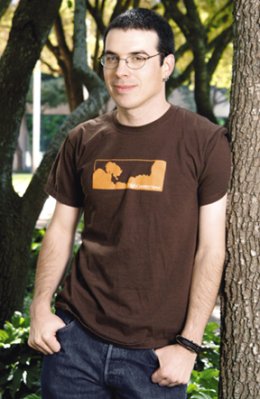Excerpts from the interview:
“I'm basically a pretty joyless, misanthropic person, but I think my writing is my least soft side. If you read all my stories, I think it would be easy to hate me. I don’t really understand how or why my writing actually resonates with other people, it all seems faintly mysterious. I know what I'm trying to write, but the alchemy that happens between the reader and my writing is extraordinary. I don't know what they're seeing, exactly. What I see is all this darkness, this relentless march of black horribleness, but then someone will say, 'You know, "The Calorie Man" kind of has a happy ending.' and I think, huh, I did throw the reader a bone there, didn't I? But if I wrote all the stories as nastily as the ones I have bubbling around in my gut, I would have to kill myself! After I finished a story recently, all I felt was an immense blackness. It’s hard to take after a while. And when my wife reads a story, she bursts into tears and says, 'Why can't you write anything nice?' But at least it affected her -- all the way through, it worked.”
*
“ 'The People of Sand and Slag' might be the most representative story in terms of what I feel about our willingness to accept. When I was writing it I was thinking, 'If we get the idea that science and technology are the ascendant solutions to all human problems, does that mean that what we'll get is an amplified version of ourselves?' Even if we work out ways to find enough food and entertainment and things we see as beautiful, it doesn't mean we'll behave in an ethical or holistic way. We can lose a lot while we're still managing to stick food into our food holes.
“That's what the story is really about. Yes, we can have all the technology in the world and still make some really, really bad decisions. We can create a hell where nothing is left alive except for us, but where we can be very comfortable, because we'll accept whatever we have to in order to meet our immediate desires. Ultimately, the characters are given a choice between preserving something that's natural versus their entertainment and expediency, and they naturally choose entertainment and expediency first. And we do that every day.”
*
“One of the things I'm wrestling with right now is the degree to which I'll be a commercial writer. I had a really interesting conversation with an agent, discussing what to do if you're going to have a decent novel-writing career. One of the things you need to do is have somebody come back for the second book, and the jury's out on whether anybody would come back for a second book of mine. People can endure the abuse of one of my short stories, but how do you get them to endure (first of all) the 400 pages of abuse in a book from me? And then, if I'm interested in having a real career as a novelist, how much comfort am I going to throw them so they will read another book of mine? Maybe I'm always going to be a small-press writer, just a short-story writer (as long as Asimov's and F&SF survive).
“I'm working on a book based on 'The Calorie Man' and its sequel, since there's more stuff I want to unpack from the premise. 'The Calorie Man' is mostly about genetic modification in foods. But it ended up as a strange hybrid where I was also handling 'peak oil' -- worrying about what happens when we run out of energy. Science fiction has a hard time deciding where its energy comes from. We forget that our computers are coal powered; that everything we use comes from mined materials, from something that got yanked out of the earth or was cut down, reduced to plastic somewhere.”
*
“I’m not particularly optimistic about humanity’s long-term prospects. We choose what's convenient, expedient, and profitable over almost anything else, all the time. We create all sorts of distractions to pretend we aren't that way, but you have to look at what we do. We are absolutely rapacious. I have had conversations with people who are convinced that science and technology will bail us out of any problems we run into down the road. They say the free market will solve it, our ingenuity will solve it -- in that good old American way, 'We'll put our shoulders to the grindstone and solve that problem, by gum!' And yet in everything that I see us doing, we choose the short-term over the long-term, the profitable over the unprofitable, the easy over the hard, the simple and immediate over the complex.”
*
“In 20 years there will be no glaciers left in Glacier National Park, and everybody will say, 'Oh yeah. What was up with glaciers?' It will be historic, but it's hard to freak out about it. And it's hard to freak out about the fact that the pika are slowly being squeezed up the mountain sides and out of their bio-zone because of changing temperatures, to the point that they won't exist as a species because they won't have anyplace to go.
“We aren't equipped to care about things that are remote, abstract and complex; we're built to worry about tigers. And now we've got this huge, complex society that creates really big tigers that you can't see or hear or feel. They're going to get us eventually, but it's going to be our children who get it. My son is going to face the tiger.”

